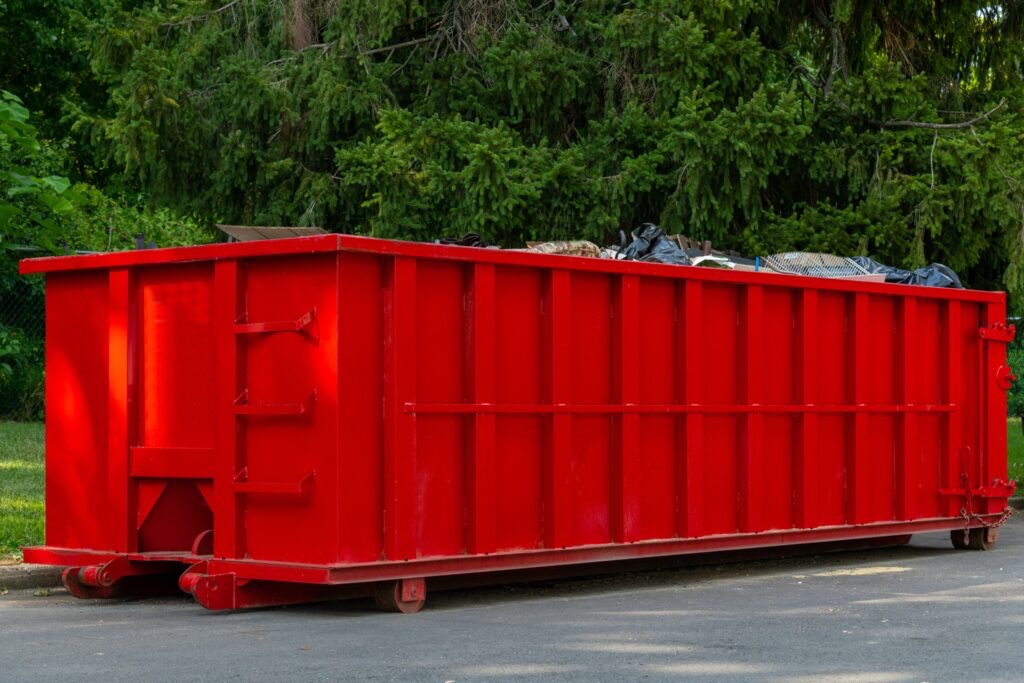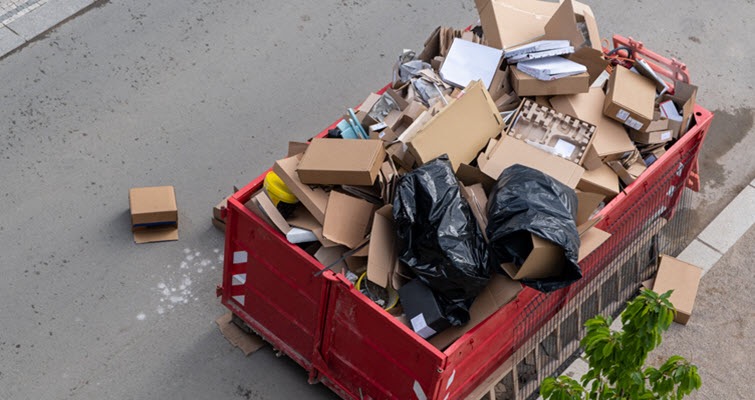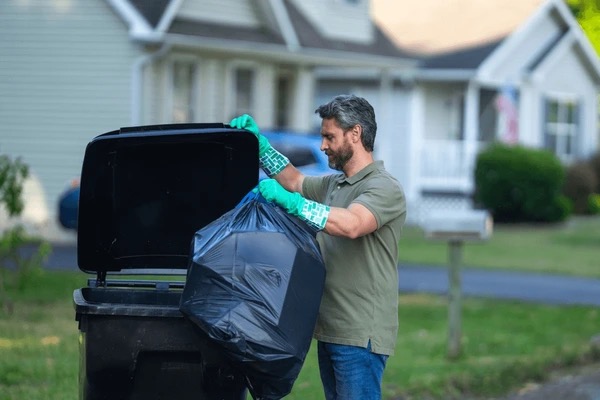
How Can I Avoid Overage Fees on Dumpster Rental?
Understanding Dumpster Weight Allowances
Every dumpster comes with a base weight allowance — an invisible line you cross at your own expense. This number is preset by your provider and factored into your initial rental cost. Go beyond it, and you’re charged a per-ton overage fee, often ranging from $85 to $150 per extra ton.
So what does weight actually look like?
A standard couch: ~150 lbs
One bundle of shingles: ~250–300 lbs
A single toilet: ~100 lbs
Drywall: ~500–750 lbs per room demo
Concrete: ~2,000+ lbs per cubic yard
So, yes — a garage cleanout with old tile and furniture can easily blow past a 2-ton limit without you realizing it. Especially if rainwater adds weight (more on that later).
Pro Tip: Ask your provider not just for the dumpster size, but the exact weight limit included in the price. That number matters more than the bin’s dimensions.
What Are Dumpster Overage Fees?
Overage fees are the silent budget killers of the rental world. You won’t see them on the front page of a dumpster company’s website. You might not even notice them in the quote, because they’re only triggered after your dumpster is picked up, weighed at the landfill, and billed.
Here’s how it works:
- You rent a 20-yard dumpster with a 3-ton limit
- You unknowingly fill it with heavy waste (say, wet roofing and broken tile)
- The final weight? 4.2 tons
- You’re billed for the 1.2 tons of overage at the provider’s rate — say, $110/ton
- That’s $132 in surprise fees, not counting potential handling surcharges
And unlike other fees, overage is rarely negotiable. It’s measured by certified scales and enforced by the landfill itself.

How Can I Avoid Overage Fees on Dumpster Rental?
Dodge them like a seasoned contractor. Here’s how:
1. Select the Right Size Dumpster for Your Job
Choosing the right dumpster size is more than just a guess — it’s a precision decision that can save you from hefty overage fees later. The trap most people fall into is renting by visual volume alone. But dumpster rental isn’t about how big your project looks; it’s about how dense your debris is. A 10-yard dumpster might seem adequate for a bathroom remodel, but throw in tile, drywall, and a cast iron sink, and you’ll max out the weight allowance well before filling the container. That’s how people end up with two-ton overages on half-full bins. Always start with your material type. Light waste like foam, cardboard, or old clothes might fit a small dumpster, but heavier materials demand a larger bin with a higher tonnage cap — even if you don’t use all the space. And in places like Wilmington, DE, where landfills bill by the pound, that detail matters. Talk to your provider with specifics: instead of saying “I’m doing a cleanout,” say “I’ve got 600 pounds of tile and two toilets.” They’ll size your bin based on real load, not vague assumptions.
2. Do Not Overfill Your Dumpster
Overfilling your dumpster doesn’t just break the rules — it breaks your wallet. When debris piles above the rim of the container, your hauler is forced to make a decision: either refuse pickup and charge a trip fee, or haul it anyway and pass along overflow penalties and safety surcharges. Even if you’re technically under the weight limit, stacking above the fill line creates an illegal and unsafe load. It’s the roll-off equivalent of driving with your trunk flapping open and garbage flying out. In Wilmington, waste haulers are held to strict DOT regulations, and that means if your dumpster isn’t level-loaded, it’s a no-go. The smart approach? Break down furniture, flatten boxes, and load your bin evenly, low and compact. A few inches below the top edge is better than a few hundred dollars in violations.
3. Watch What You’re Putting in Your Dumpster
Not all trash is treated equally — some items are heavier than they appear, while others are straight-up restricted. If you toss in a mattress, refrigerator, old television, or even a single can of leftover paint, you’re risking additional surcharges or full rejection at the landfill. Delaware’s disposal laws are strict about what can and can’t be dumped, and providers are fined for bringing banned materials to disposal sites. That fine becomes your fine. On top of that, dense waste like gravel, bricks, or wet lumber may not be technically prohibited, but can skyrocket your load weight. That’s why every renter should ask for a list of prohibited and surcharge-triggering items before loading begins. Throwing without checking is the easiest way to end up paying for someone else’s mistake, and no one likes sorting through trash to fix it after the fact.
4. Avoid Long-Term Dumpster Rentals (If Possible)
The longer a dumpster sits on your property, the more unpredictable its final weight becomes. At first, it’s just your job debris. But after a few days? It’s rain-soaked insulation, a neighbor’s mystery bag of junk, and maybe a few “extras” you didn’t plan to toss. That’s the weight trap of long-term rentals. Wilmington weather doesn’t play nice with open bins, and every soggy day adds invisible mass. Add in the risk of illegal dumping, and your neat 2-ton plan becomes a 3.8-ton problem — and a steep overage charge. Keeping your dumpster rental short and tight is the best move. Plan your project timeline first, then order the bin right before the work begins. The shorter it’s on-site, the more control you have over what goes in and how much it weighs.
5. Cover the Dumpster During Bad Weather
Rain isn’t just moisture — it’s weight. And for dumpsters filled with porous materials like drywall, fabric, wood, or cardboard, a single storm can turn a light load into a financial nightmare. Water saturates everything it touches, and guess what? Landfill scales don’t care whether that weight came from bricks or rain. If your bin tips the scales past the included allowance, you’re still paying for it. That’s why it’s essential to cover your dumpster during bad weather, especially in Wilmington’s wetter months. A sturdy tarp can shield your debris from saturation, and some providers even offer covered bins for long-term projects. If your rental spans more than a few days, protecting it from the elements is one of the smartest (and cheapest) moves you can make.
6. Use an Inert Dumpster for Very Heavy Material
Heavy debris jobs aren’t just about bulk — they’re about density, and density needs special handling. If you’re removing concrete, bricks, soil, asphalt, or similar materials, a standard roll-off dumpster is the wrong choice. These materials can exceed standard weight limits in just a few cubic feet, leading to massive overage charges. Instead, ask your provider for an inert dumpster, a special container designed for dense loads. These bins are often shorter to help with weight distribution and come with flat-rate pricing or elevated tonnage thresholds. Using the right bin for the right job not only prevents surprises, but it also ensures your debris is processed legally and efficiently at the right facility. This is especially important for construction projects in Wilmington, where disposal rules for inert waste differ by site and load type.
7. Beware of Illegal Dumping in Your Dumpster
An open, unattended dumpster is an open invitation. If your bin is visible from the street or left uncovered overnight, there’s a high chance someone will use it — and not to do you a favor. Whether it’s neighbors trying to sneak in an extra trash bag or contractors looking for free disposal, illegal dumping is a real problem, especially in urban parts of Wilmington. And here’s the worst part: whatever they throw in, you’re legally and financially responsible for it. If the added junk pushes you over the weight limit or contains prohibited materials, those charges hit your invoice, not theirs. To prevent this, keep your bin on private property whenever possible, ask for a lockable lid, and use a weatherproof cover when not in use. Controlling access is the only way to ensure you’re not stuck paying for someone else’s mess.
8. Reduce the Amount of Trash You’re Tossing
Not every piece of waste needs to go in the dumpster. One of the best ways to avoid overage fees is by reducing the total volume and weight of what you throw out. That starts with sorting. Items like cardboard, metal, electronics, and some plastics can often be recycled at no charge through Wilmington’s municipal services or local recycling centers. Usable furniture or building materials might be accepted by organizations like Habitat for Humanity ReStore or GreenDrop. Beyond that, breaking down large items, like furniture, pallets, or packaging, makes loading more efficient and minimizes unused airspace in the bin. Every pound you keep out of the dumpster is a pound you don’t pay to dump. Less waste equals less risk, and smarter sorting is the easiest fee-avoidance strategy there is.
Work With Us to Avoid Overage Fees for Your Dumpster
At A1 Dumpsters Rental, we help you avoid the fees you never meant to incur. We walk through your project before delivery. We recommend the best size, the right type, and we spell out the exact weight allowance — no vague math, no surprises after pickup.
Our dumpster rental services in Wilmington, DE, are designed for real people with real budgets. And that means helping you rent smarter, not just bigger.

